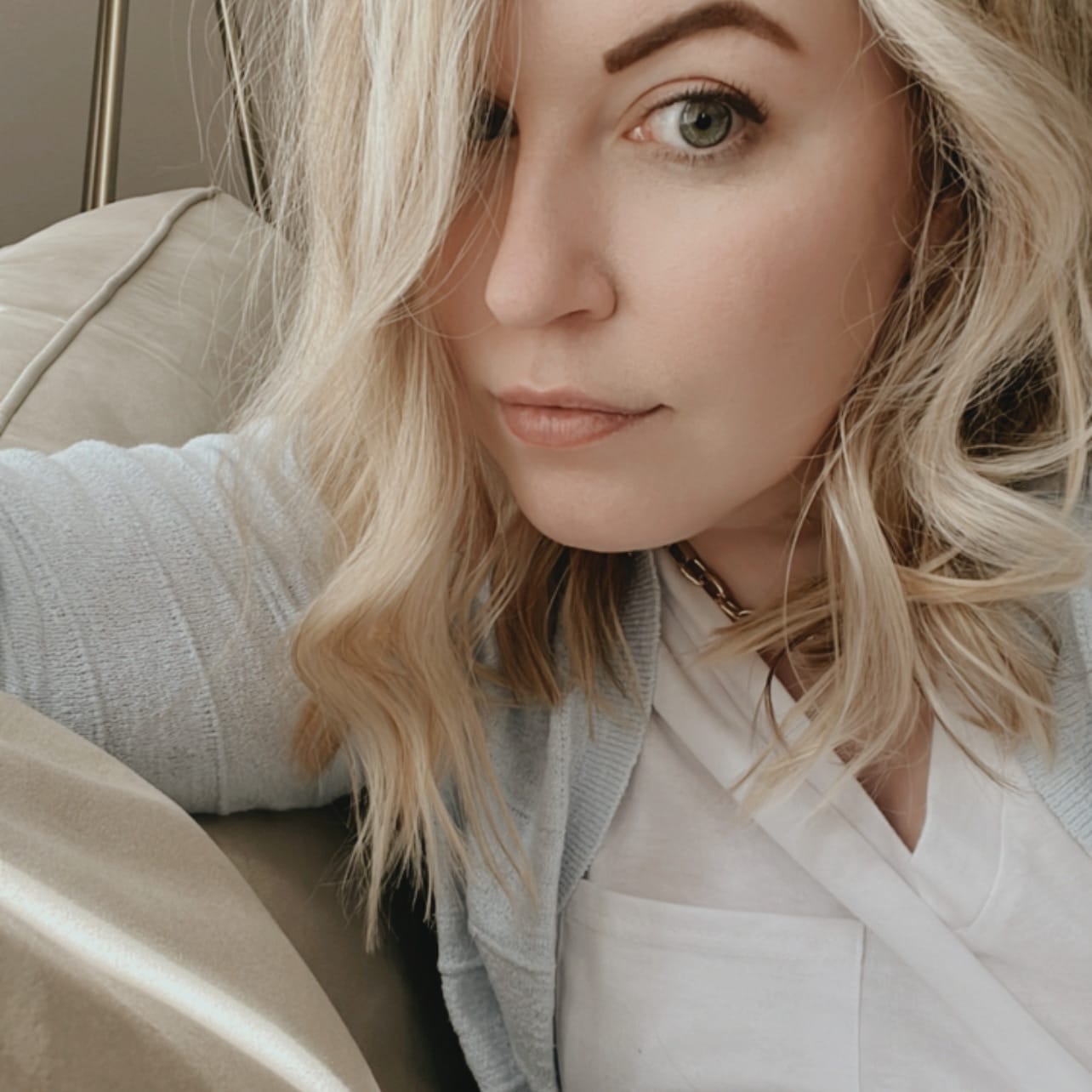Tiny Stories, Volume 2
I once told a former boyfriend that I wasn’t in the mood to smile and that pirates don’t smile anyway. He then edited the Wikipedia page for pirates to say that pirates should smile. This says more about that relationship than I can ever explain.
The sound of the car warming up in the winter fills me with the most unsettling mix of nostalgia and anxiety. It is reminiscent of family vacations and early morning school events and my dad leaving for work while the rest of us were still in bed.
I have a note in my journal that simply reads: “Fred cells > incels,” which only makes sense in the extremely weird context of that night, when I had two decaf lattes at 9 p.m. and could feel every cell of my body vibrating. And all of the cells were named Fred.
Learning to Thrive
In January, I started working with a new therapist. We paired up on Talkspace, an app I’ve used and loved for years. I had been taking a break from regular sessions with a previous therapist and wanted a fresh start with a new “safe space person.” I was determined that 2023 was going to be the year when I actually made some big changes in my life, and it turns out that Ashley was exactly the person I needed by my side on this journey.
(When I found out that Ashley was also a Chicago native who had landed in Tennessee, I actually screeched at my laptop screen. She gets me in so many other ways, too, but there’s just something about the Chicago bond that makes me happy.)
When we first started working together, I was feeling incredibly stuck. I was overwhelmed by chronic fatigue, weight gain, and other health mysteries. I had stepped down from caretaking in 2020 but still couldn’t find a way out of Tennessee. I had an enormous amount of debt. I felt lonely and abandoned. I was having stress dreams every night.
I didn’t know where to start, but I knew that I couldn’t do it alone. I was asking Ashley for help, and after learning a lot of other lessons, I learned to ask other people for help, too. Do you know how great it feels to let other people actually care for you and support you? It’s gosh dang life-changing.
Anyway, I wanted to share what I’ve learned so far (and document it for myself), so here are the four big themes I’ve worked on in therapy and how they actually helped me get out of debt, get out of Tennessee, rekindle my friendships, and find some much-needed healing.

Setting Boundaries
The very first thing that I wanted to work on was setting boundaries. I have a framed piece of art with the following quote: “May the bridges I burn light the way.” Until this point in my life, that was the only boundary-setting I knew how to do. Melissa Urban has an amazing book on this topic, and she always gives three scripts of what to say with increasing levels of gravity: green for when you want to gently inform someone of a boundary you will be holding, yellow for when you need to share a kind and firm reminder of that boundary and its consequences, and red for when you are enforcing those consequences (walking away, refusing to visit, etc.).
I had been skipping the green and yellow steps and just yeeting people off of a cliff with a red consequence and no explanation. 🤷🏻♀️ Once I started practicing the first two steps, though, I saw immediate improvements in every relationship. It's obvious in hindsight, but assuming that other people can read your mind and change their behavior accordingly is insane. And wandering around with resentment toward those people is doubly insane.
So for example, when my dad offered that I could crash at his house for a month while I did some job-searching, I accepted with gratitude and also clearly communicated one boundary: I did not want him to nag me to play piano for the dog. (Yes, I sighed deeply while writing that sentence, and yes, we will talk about it later.) He was a bit surprised by this request but was very understanding, and my time here has been that much more enjoyable because we have that mutual respect.
As Melissa says: “Clear is kind.”
Identifying Emotions
Once I started setting boundaries, I realized just how much of my life is spent biting my tongue and being angry about things. I was explaining this to Ashley, while trying not to sound like a murderous psychopath, and she lovingly laughed and took out her emotion wheel pillow. (Agreed, “emotion wheel pillow” is a crime scene of a phrase, but just bear with me.)
She explained that anger is a pretty big emotion and is often an umbrella term for more specific emotions—that’s the whole point of the emotion wheel tool. She then read out a few options: betrayed, disrespected, frustrated. Those all felt right, and by getting specific, I could identify that betrayal was an on-going theme in a lot of my stress dreams and nightmares. I was reliving past trauma every night while I slept—in large part because I didn't have the resources and the vocabulary to process my emotions during the day.
I have had terrible dreams for as long as I can remember, so this will likely always be my body’s default way of coping with stress and working through emotional experiences. But using the emotion wheel while I journal has helped me sleep better, and it also helps me communicate in my relationships. When you know that you’re feeling abandoned or inadequate or resentful, it’s so much easier to trace those feelings back to the root cause instead of just stewing about in a puddle of grumpiness.
Unhiding the Scary Stuff
Speaking of feeling abandoned, that’s exactly where my therapy journey went next, and I never could have predicted that. I had a cozy childhood, and I still love and adore my immediate family. I am the fastest bridge-burner in the Midwest, so I’ve never really felt abandoned by friends or partners, either.
But Ashley had recommended that I read It Didn’t Start with You, a book on inherited trauma. Not the cheeriest topic for a party, but wow, the science is amazing—how our DNA is literally rewritten by the trauma we experience and then passed on to our children and grandchildren. I was talking about the book with my dad when he confided in me about his own childhood experiences of abandonment. His stories allowed me to understand him more than I ever have, but in the context of the book, I also learned a bit about myself.
I know that my dad has made himself a promise to never leave his family. He has always protected us and provided for us generously. What looks like and feels like wonderful parenting can also be a trauma response for him. It’s one of those “both can be true” situations. And for me, I have learned from my dad—and inherited from him—the idea that loving someone means showing up for them before showing up for yourself, taking care of others rather than caring for yourself, and putting loyalty on a pedestal above anything else.
It’s why I stepped up to be a caretaker for my grandparents. It’s why I only stopped caretaking once my body was too broken to carry on. And it’s why I am notoriously bad at the next lesson: letting other people take care of me.
Asking for Help
As I mentioned earlier, the reason I started working with Ashley is because I felt stuck. I didn’t know what to do about it, but I was at my wit’s end trying to sort things out on my own. I only felt safe asking for her help because she was someone who was paid to support me—someone who willingly signed up to care for me.
This is painfully obvious now, but it took me until August to realize that I am actually surrounded by people who willingly signed up to care for me. People who have been waiting for me to let my guard down, so they could show me what love and care and support truly look like. That’s the definition of friendship. And I have some really, really good friends.
So I started leaning on my friends and family, and they responded with enthusiasm. I got help finishing my résumé. I hired a fitness coach. I was given a solution to my debt. I was gifted dozens of cards from people who love me, and I'm still getting more in the mail. And in the span of two weeks in September, I gave away or packed up everything I own and moved out of rural Tennessee.
I am no longer stuck.
And I guess the point of this is that I was never actually stuck to begin with—this was a journey that I could not manage on my own, and I am so grateful for the people who patiently waited for me to figure that out. To my friends, family, and beloved therapist, thank you for helping me learn to thrive.
Giving Back
Last week, I was able to donate blood at a local place in Cincinnati, and during the check-in process, the staff confirmed that they serve the hospital where my mom was treated before she died. She needed so many transfusions after her bone marrow transplant and in the two months that followed, and I was always so grateful for the kind people who made that possible. I became a donor that same year (2021), but this is the first time I actually felt like I was repaying the debt—and y'all, it was a really great feeling.
